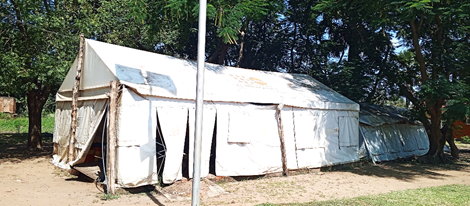DRDIP Solar Projects Excite Schools
Mamu Samir (not his real name) a primary six pupil of
Kena-Valley Primary school inside Bidibidi Refugee Settlement in Yumbe district
cannot control his smiles as he glares constantly at the team from the Office
of the Prime Minister alongside local leaders who paid a visit to his school
hardly a month after the re-opening of schools owing to the effective COVID-19
preparedness by the Ministry of Education and Sports. The visiting team were conducting an
assessment of work done by contracted implementing partners(IPs) of the
Development Response to Displacement Impacts Project (DRDIP) in the West Nile
Sub region.Kena Valley Primary School in Bidibidi Camp, Yumbe district
On face value, you could think Samir is excited just to see the visitors, but a brief chat with the 14-year-old refugee child unlocks the truth. He is more awestricken by the new development at his school. Samir exposed the source of his contagious happiness to Robert Owiny.
“Now
I am sure of getting first grade in PLE because of the solar in our school”, he
pronounced. He goes on, “at night
instead of sleeping early, now we come back to school to read in the evening,
how can we fail to pass?”.
Samir
also described learning before the solar installations as “difficult”, sighting
the limited time to revise his notes during day time and the absence of space
and lights at home during evening hours.
“These days we come to school to read in the evening and go back home only
to sleep”.
The
school deputy head teacher, Mr. Toah Swaibu confirmed that DRDIP community
structures in Yumbe district contracted Green
Power International that installed the solar lighting system in all the six
classroom blocks at Kena Valley primary school. Mr. Toah adds that, “this solar project has
benefited all the classrooms, the offices, staff room and the senior woman
teacher’s chamber”. He said, “I am more than sure that our academic performance
will go up due to this support”.Itula Primary School, Obongi district
Several
other children, teachers and parents in the refugee settlements and the host
communities in West Nile sub-region where DRDIP has similar installations, share
the same joy as Samir and his teacher. The beneficiaries cannot hide their
appreciation to the Office of the Prime Minister, for the DRDIP initiative. The
community members hardly complete their stories of change through DRDIP without
crediting the local, national leadership and the World Bank for providing
funding.
At
Itula Primary school in Obongi district, the installed solar system lights up
10 classroom blocks and this gives teacher Roseline Dipio confidence that the
school academic performance will rise. “See these security lights and we have
the lights inside 10 classrooms, we can only expect better performance”, Dipio
bragged. She said, “the lights have made it easier for teachers to make lesson
plans during evening time and pupils too are able to read at night”. Dipio also noted that the solar lights have attracted
more pupils to the school. “Our school enrollment has gone up from about 750 before
solar to now 913”. Of the total current enrollment at Itula primary school, 406
(209boys, 197girls) are refugee children while 507(246boys, 261girls) come from
the host communities.
At
another institution, Takwa Primary school in Yumbe district, the school
enrollment spiked from 1,300 pupils before the Solar lights were installed to
1,700 pupils currently. Ratibu Ngulu, a
community member said the street lighting provision has helped reduce on cases
of rape that was rampant within the community and was affecting school children.
The
DRDIP institutional solar installation sub projects in schools fall under the project‘s
component two; Sustainable Environment and Natural Resource Management (SENRM).
It is also the SENRM sub component two; - access to energy which seeks to promote alternative energy sources
for cooking and lighting including potential public private partnerships.
Hitherto, DRDIP has successfully completed the
implementation of 190 solar installation sub projects across all the 15 districts
of intervention. This gives a 70% completion rate considering the 270 sub
projects that were approved for support.
Funded by the World Bank, DRDIP’s overall objective
is to improve access to basic
social services, expand economic opportunities and enhance environmental
management for refugee hosting communities. The 15 districts where the OPM implemented project
serves includes; Adjumani, Moyo, Obongi,Yumbe, Koboko, Terego, Arua and Madi-Okollo
in the west Nile sub region. Isingiro, Kamwenge, Kyegegwa in the mid-western
sub region. Hoima, Kikube and Kiryandongo in the Bunyoro sub region and Lamwo
in the Northern region.





Comments
Post a Comment